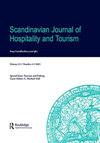共同创造的开放空间:以社区为基础的旅游产品多样化方法
IF 3.6
4区 管理学
Q2 HOSPITALITY, LEISURE, SPORT & TOURISM
Scandinavian Journal of Hospitality and Tourism
Pub Date : 2023-01-01
DOI:10.1080/15022250.2023.2174183
引用次数: 1
摘要
摘要尽管提出了广泛的全球建议,但当地社区很少参与制定战略性旅游发展方案。同样,促进这些共同创造过程的方法也没有得到充分实施、测试和推广。本研究旨在通过评估以旅游产品战略多样化为中心的参与式规划方法的潜力,为这一知识体系做出贡献。以瑞典哥特兰岛为重点,该岛的旅游动态部分取决于游轮对汉萨小镇维斯比的访问,举办了一个基于开放空间方法论的研讨会,当地企业家、组织代表、学生和国际旅游研究人员参加了研讨会(原创贡献)。结果表明,这些“合作竞争”过程有助于识别问题并确定可能的解决方案。在我们的案例中,这些选择可以在“渗透”概念(修改现有产品并将其更多地推广到现有市场)的框架内,涉及与物理和数字基础设施相关的方面,以及利益相关者之间的伙伴关系和合作。总的来说,这项研究表明,当地社区成员和非成员之间的互动似乎对创新思想的出现至关重要。本文章由计算机程序翻译,如有差异,请以英文原文为准。
Open spaces for co-creation: a community-based approach to tourism product diversification
ABSTRACT Despite generalised global recommendations, local communities are rarely involved in defining strategic tourism development options. Similarly, methodologies to facilitate these processes of co-creation have not been adequately implemented, tested, and generalised. This study aims to contribute to this body of knowledge by assessing the potential of a participatory planning method centred on the strategic diversification of tourism products. Focusing on the Swedish island of Gotland, where tourism dynamics partly depend on the visits to the Hanseatic town of Visby by cruise ships, a workshop based on an Open Space Methodology (OSM) was implemented, involving local entrepreneurs, representatives of organisations, students, and international researchers in tourism (an original contribution). The results revealed that these “coopetition” processes can contribute to identifying problems and determining possible solutions. In our case, these options can be framed within the concept of “penetration” (modifications and increasing promotion of existing products to the existing markets) involving aspects related to physical and digital infrastructures, along with partnerships and collaborations amongst stakeholders. Overall, this study reveals that the interaction between members and non-members of the local community appears crucial for the emergence of innovative ideas.
求助全文
通过发布文献求助,成功后即可免费获取论文全文。
去求助
来源期刊
CiteScore
7.90
自引率
8.30%
发文量
14
期刊介绍:
Scandinavian Journal of Hospitality and Tourism is the leading Nordic journal for hospitality and tourism research. SJHT aims at initiating and stimulating high-impact and innovative research relevant for academics and practitioners within the hospitality and tourism industries. The journal takes an interdisciplinary approach including, but not limited to geography, psychology, sociology, history, anthropology, and economics. SJHT encourages research based on a variety of methods, including both qualitative and quantitative approaches. The journal covers all types of articles relevant to the Nordic region, as well as the North Atlantic, North Sea and Baltic regions. We also welcome reviews and conceptual articles with a broader geographical scope that clearly enhance the theoretical development of the hospitality and tourism field. In addition to research articles, we welcome research notes and book reviews. Published articles are the result of anonymous reviews by at least two referees chosen by the editors for their specialist knowledge.

 求助内容:
求助内容: 应助结果提醒方式:
应助结果提醒方式:


